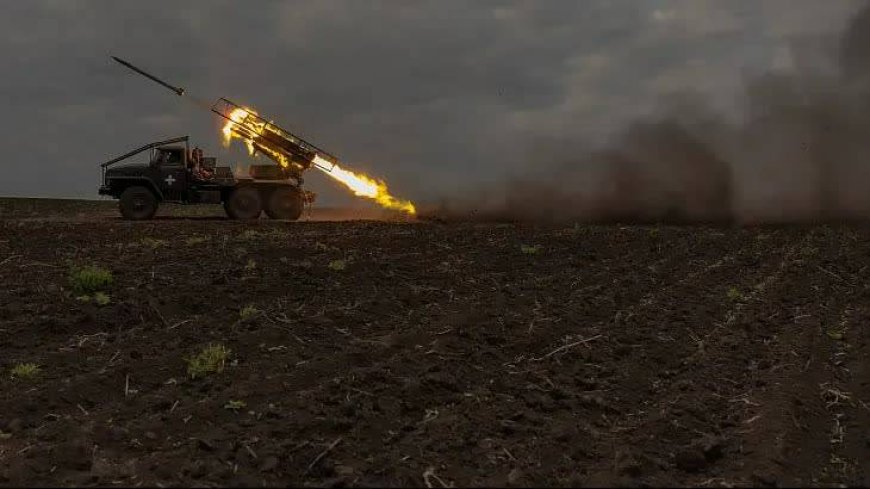Ukraine's Nightmare: Will Kharkiv Offensive Turn the Tide of War?

In the wake of weeks of intense speculation surrounding a potential Russian assault on Kharkiv, the Ukrainian Ministry of War made a startling announcement on the morning of Friday, May 10, revealing the advancement of the Russian army into this highly strategic region situated in eastern Ukraine.
According to Ukrainian officials, it became apparent that within the initial hours of this advancement, the Russian military forces made significant territorial gains by pushing several kilometers into the eastern outskirts of Kharkiv and breaching the sovereign borders of Ukraine. Addressing the media in a news conference, Ukrainian President Volodymyr Zelensky remarked, "Russia has initiated a novel form of offensive maneuvers, with fierce clashes currently unfolding in this vicinity." The Ministry of Defense of Ukraine, in a communiqué issued on Friday, detailed that over the preceding day, Russia conducted precision airstrikes utilizing guided air missiles in the Vovchansk sector, contiguous to Russia's Belgorod Oblast. The commencement of a distinct military operation by Russia in Ukraine over two years ago continues unabated, with the recent assault on Kharkiv marking a fresh chapter in the protracted conflict with Ukraine.
It is imperative to acknowledge that in recent months, amidst the backdrop of extensive military backing from Europe, the United States, and their allies in Ukraine, the global community has been anticipating a retaliatory strike or a campaign aimed at reclaiming territories lost to Kiev. However, the prevailing reality on the battlefield depicts a resurgent Russia making formidable strides in its offensive endeavors. Conversely, Ukraine finds itself embroiled with myriad challenges in the wake of over two years of confrontation with Russia, which has taken a toll on the morale and readiness of its armed forces. The initial fervor among Ukrainians to enlist in the struggle against the Russian military has waned, while the comprehensive support extended by the West to Ukraine has dwindled over an extended period. Ukrainian military commanders have lamented the dearth of troops for launching offensives and counterattacks, with the existing manpower deemed barely sufficient to uphold current positions amidst the escalating Russian onslaught. Notwithstanding prior assertions by Ukrainian authorities regarding intelligence assessments anticipating an imminent Russian incursion into the Kharkiv Oblast, owing to the amassed Russian forces along the northeastern border of Ukraine, the eventual assault by Russian forces commenced with artillery and aerial bombardment, followed by a ground offensive as armored units surged into the northeastern reaches of Ukraine.
Renowned writer and Russian affairs analyst Gilbert Doctorow opined, "The ongoing crisis, in essence, stems from strategic miscalculations on the part of the Ukrainians. They endeavored in recent years to fortify their defenses and sever ties with Russia, despite seeking assistance from Western allies. Regrettably, their defensive fortifications remain porous, exposing vulnerabilities that have been ruthlessly exploited by Russian forces in the ensuing conflict."
Heightened apprehensions within Ukraine concerning the Kremlin's intentions in the Kharkiv Oblast were exacerbated by Russian President Vladimir Putin's call for the establishment of a buffer zone within Ukrainian territory. Citing this move as a response to the influx of new American weaponry and supplies to Ukraine, Putin underscored the imperative of creating a buffer zone to shield Russia from Ukrainian artillery bombardment and border incursions.
In accordance with the Institute for the Study of War (ISW), a prominent Washington-based think tank, the Russian military achieved a "significant tactical breakthrough" with its offensive thrust into Ukraine's Kharkiv Oblast on Friday. According to reports in the Ukrainian newspaper Ukrainska Pravda, maps furnished by the Institute of War Studies delineate Russian forces engaging on two fronts across the border, culminating in the capture of the villages of Strilecha, Krasne, Pyl'na, and Borysivka. Kharkiv, situated approximately 30 kilometers from the Russian frontier, stands as Ukraine's second-largest city and has borne the brunt of sustained aerial and missile bombardments for an extended period. The Russian forces are anticipated to execute the initial phase of an offensive campaign to the north of Kharkiv with limited tactical objectives, ultimately aiming to draw resources away from critical frontline areas in eastern Ukraine. An illustrative map from the ISW portrays Russian forces mounting assaults on the Kharkiv Oblast from two distinct directions, "one to the north of Kharkiv towards Lypetske and another northeast of Kharkiv close to the city of Vovchansk." Against this backdrop, the emergence of Russia as the vanguard in this nascent front opening in eastern and northeastern Ukraine, with consequential strategic and operational ramifications likely to unfold in the ensuing days and weeks, as Ukrainian forces pivot towards this new theater at the expense of neglecting other fronts, is a plausible outcome.
In conclusion, the recent incursion of the Russian army into the Kharkiv Oblast of eastern Ukraine signifies a pivotal juncture in the protracted conflict, underscoring the strategic and tactical prowess of Russia amid mounting challenges faced by Ukraine. The evolving dynamics on the battlefield, coupled with shifting alliances and geopolitical maneuvers, portend a complex and uncertain future for the region, with profound implications for the balance of power in Eastern Europe. As the world watches the unfolding developments with bated breath, the repercussions of this latest escalation are poised to reverberate across the global stage, shaping the contours of international relations and security paradigms in the days and weeks ahead.













































